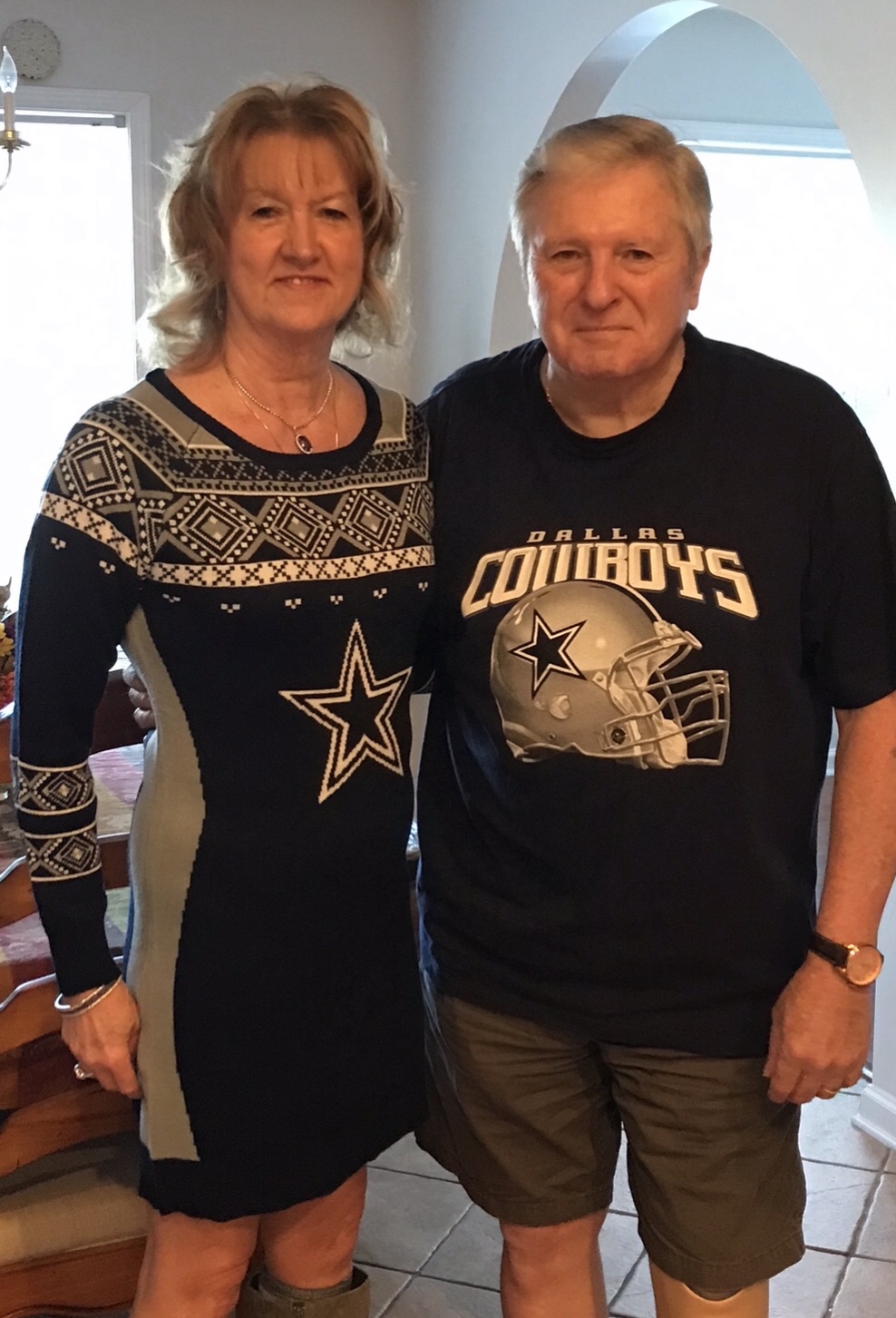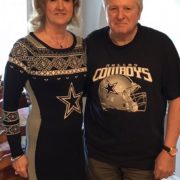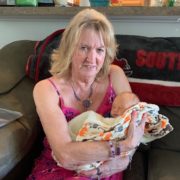
JANET McNABB: A 23-Year Pancreatic Cancer Survivor
She Was Originally Misdiagnosed
Written By: Julia Brabant
August 3, 2020
Diagnosed: 1996
Status: A 24 -Year Survivor, September 2020
As a 23-year pancreatic cancer survivor, South Carolina’s Janet McNabb is in a league of her own. Had doctors uncovered her condition even two months later than they did, though, she may not have made it past 1996.
Janet, a Registered Nurse working in the operating room and a married mother of three based in Myrtle Beach, first recognized something was wrong in late 1994. She began suffering severe abdominal pains that radiated all the way through to her back. Her doctor, a gastroenterologist, suspected bacteria in the stomach and treated her accordingly.
When that failed to alleviate her symptoms, her doctor considered other possible causes. Ruling out ulcers, he suggested it was her gall bladder and referred her to a general surgeon. Janet’s pain was so severe that she moved forward with a laparoscopic cholecystectomy, which is a gall bladder removal procedure. After the surgery, her doctor confirmed what he had already suspected – nothing was wrong with her gall bladder.
Over the course of the next 16 months, Janet began a troublesome pattern of collapsing while working in the operating room, after which she would have to be taken to same-day surgery and sedated before staff would call for someone from home to come get her. Each time this happened, her charge nurse asked the gastroenterologist to check on Janet, and each time, he refused, stating that he was too busy.
Finally, after numerous episodes, he did visit. She again explained what was happening, which she had done over the phone already on several occasions. Each time, he’d told her, “I need to see you when this is happening.” On this occasion, though, he told her in front of her charge nurse, the operating room director and some of her coworkers that there was nothing else he could do for her and she’d “just have to learn to live with the pain.”
Watching her suffer was not something Janet’s husband, Bill, intended to do, so he told Janet to ask someone from work if he could recommend a contact at the Medical University of South Carolina. Janet hesitated at first, stating that she had to work with this doctor and all of the others. At Bill’s insistence, though, she finally connected with her friend who had been a resident at the Medical University of South Carolina.
He recommended she meet with Dr. Bill Marsh. Janet scheduled an appointment and made the trip to Charleston to see him.
Within 15 minutes, he’d told her the pressure was building too high in the sphincter of oddi and that she would need an endoscopic retrograde cholangiopancreatography, or ERCP (a procedure used to diagnose diseases of the gall bladder, biliary system, pancreas and liver), to measure the pressure. A sphincterotomy, he told her, was also necessary. He no longer performed ERCPs, so he made her an appointment with Gastroenterologist Paul Tarnaski.
She underwent the gall bladder and duct procedures and went home, but in the days that followed, she became increasingly ill and called Dr. Tarnaski again to inform him. He said she needed to come back in for another ERCP of the pancreatic duct, so she returned the following week for the procedure.
Dr. Tarnaski explained that there was an experimental stent available if she would like to try it. He noted that it would require an overnight stay and another ERCP to remove the stent, but that it seemed to decrease the chances of pancreatitis by as much as 40%. Janet and her husband decided to try the stent.
The next morning, they performed the ERCP to remove the stent, at which point they discovered it had vanished. They also uncovered something highly unusual. The stent had been pushed out of the pancreatic duct, and a tumor on the head of her pancreas had turned outward, allowing them to see it for the first time. It was so unusual that Janet remembers her physicians telling her that her case would “make it into the textbooks for next year,” and it ultimately did just that.
As a Registered Nurse, Janet was well-versed in the grave prognosis often given to pancreatic cancer patients. She also understood the complex and dangerous nature of the Whipple procedure, a.k.a. a pancreaticoduodenectomy, which she was to have.
“I wanted to go to Virginia where I grew up; I wanted to go hiking and fishing, to roast hotdogs over a fire and toast marshmallows,” she said. “My husband took me, and we and a couple we knew did just that. I caught a fish. We went hiking in the mountains and built a fire, and I had my hotdogs and marshmallows. If my time was almost up, I wanted to do some of the things I loved. I knew upon returning that I still had a couple of procedures to face, and my doctors had told my husband to “fatten me up” beforehand, and he did his best.”
After doing her best to put on weight ahead of the procedure and encountering several roadblocks along the way – a hurricane among them – she underwent a colonoscopy and another ERCP to check the size of the tumor September 9, 1996. The surgeon, Dr. David Adams, told her tumor was growing fast and she’d need to undergo surgery soon. He said, “Do you want to have surgery Wednesday or Friday?”
Janet was shocked. “You mean, of this week?” she’d asked. “Today is Monday!” When the doctor said yes, she told him she’d need a few days to prepare.
“How about Friday?” the doctor asked, prompting Janet, upon noticing that that would be Friday the 13th, to ask him if he were superstitious.
He’d laughed. “Nope; I do my best work on Friday the 13th,” he’d answered. “Are you?”
Janet wasn’t superstitious, either. She visited her coworkers at the hospital, all of whom, she said, looked at her as if it might be the last time they’d ever see her. Some of the surgeons came out and hugged her, and her son, daughter-in-law and grandson came to visit. Janet’s two daughters were still living at home, and other friends visited, too.
“I was so nervous that week – I knew I only had about six months left. No one survives this cancer, I’d thought,” she said.
On September 13, 1996 Janet underwent the Whipple procedure.
“My doctor said he ‘slam-dunked my stomach into the pancreatic duct,’” she recalls. “He said I had the smallest pancreatic duct, and that everything was so little.”
He’d also told Janet’s husband that, had she waited another two months, it would have been too late to do anything.
“I feel I owe my life to my husband, Bill, for insisting I seek a second opinion,” she said.
Anyone who has undergone the Whipple procedure can attest that it’s a rough one. Janet’s surgery took two hours longer than expected, but by the time she was cognizant enough to understand her doctor’s words, they told her they’d gotten all the cancer, and that they didn’t believe she’d need chemotherapy or radiation moving forward.
While the news was certainly encouraging, the weeks and months that followed weren’t easy. She spent another 10 days recovering in the hospital in the aftermath, with her husband remaining in the room alongside her the entire time.
During that time, she experienced unimaginable pain, and she relied heavily on her husband to advocate for her when her pain medications ran low and hospital staff members ran behind schedule. She also had problems receiving IV meds, and, having the knowledge of an RN, suspected the IV was infiltrated and shared her concerns with her nurses.
They fell on deaf ears because the nurses knew her veins would “blow” easily, and they didn’t want to remove the IV and have to start a new one. They had to draw blood from her fingers, toes and feet, and they had to try time and time again to find a vein to the point where Janet would break down in tears when she saw them coming.
Years later, Janet still has chronic nausea and pain. She tried to return to work for a year and a half on a limited basis, but chronic nausea complicated matters, and she now utilizes disability benefits. She’s faced struggles with her insurance provider, recently. The insurer had always covered Zofran, an anti-nausea medication she relied on, and then the generic version of it, but then changed its eligibility requirements for coverage.
Her husband, too, has faced his own medical hardships, losing his leg in 2004 following an on-the-job accident at the U.S. Postal Service“I had a friend tell me once, ‘I’d rather die than live like you have to, with nausea and pain all the time,’” Janet said, noting that she’s lost three other friends to pancreatic cancer since her own diagnosis. “And yes; I have bad days. But I also have good days. I’ve seen two more kids get married, and I now have six grandchildren, two step-grandchildren and one great grandson born July 18, 2020.”
Janet said much of her strength comes from having the complete support of her husband and children, which she has had since the beginning. She also noted just how much it helps for patients to not only advocate for themselves when dealing with difficult diagnoses, but to have others advocate for them, as her husband did for her.
“My family doctor told me one day he uses me as an example for patients who have pancreatic cancer,” Janet said. “He said, ‘I never use your name, but you give them hope.’” Janet told him she didn’t mind at all, and that he was welcome to not only use her name, but have patients call her if they wished.
“Despite what you may hear after a pancreatic cancer diagnosis, there’s always hope,” she said. But let me tell you one thing, as a 23-year survivor – DON’T be afraid to get a second opinion and NEVER GIVE UP.”
Janet will become a 24-year pancreatic cancer survivor Sunday, September 13, 2020.





